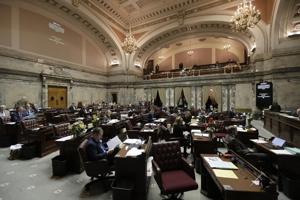Washington lawmakers push $2.2 billion pandemic aid package ahead of budget

(The Center Square) — Washington state lawmakers are in a race against time to pass pandemic relief ahead of Gov. Jay Inslee to get the state through what some fear will be another trying year.
In November, the Washington Legislature’s Republican minority were committed to limiting Inslee’s emergency powers in an effort to relax health restrictions and reopen shuttered businesses.
House Bill 1040 was written to do just that, capping the governor’s emergency declarations at 30 days and leaving their extension up to the legislative body.
As of Wednesday, the bill has not been scheduled for any legislative hearings even while state lawmakers vet Washington’s official state dinosaur.
In lieu of checking Inslee’s gubernatorial power, GOP lawmakers have resorted to taking charge of the state’s purse strings with Democrats who agree the state cannot wait until spring for the legislature to pass a state budget.
State Rep. Drew Stokesbary, R-Auburn, said the bill represented a bipartisan effort to put constituents before party.
“I think many of the items funded by the bill before us are priorities that cross chambers and caucuses and partisan and ideological lines,” Stokesbary said. “The folks who are receiving the assistance as a result of this bill really don’t care about the color of money. They just need the help right now.”
Washington Republicans have pushed to spend much of the federal aid in the state’s coffers while the Democratic majority has argued the state must hold on to as much of it as possible should the pandemic continue into the next year.
Neither party is eager to disperse a tidal wave of state money given the state’s constitutional limits on private sector bailouts and keeping taxes on workers and businesses down.
For the past few weeks, state lawmakers have eyed a $2.2. billion aid package paid for with federal dollars from the CARES Act of 2020 and other recent federal aid passed late last year.
House Bill 1368 divvies up $714 million for K-12 schools, $68 million for vaccine distribution, $240 million for business assistance grants, $365 million for rental assistance, and $26 million for food banks, among other provisions.
It sets maximum business grants at $20,000 with 25% paid in advance. A failed amendment from state Rep. Kelly Chambers, R-Puyallup, would have bumped that amount to $75,000.
In the state House, HB 1368 saw few changes save for an amendment from state Rep. Timm Ormsby, D-Spokane, freeing up the state Department of Health and Social Services to pay into the Immigrant Relief Fund without a nonprofit partnership.
On Monday, the bill passed the House by a margin of 61 to 36, but drew a no vote from Stokesbary, who shared many of his colleagues’ concerns that it would not do enough for Washingtonian renters and business owners.
“I don’t want to dismiss the importance of what this bill funds, but I think we’re missing a lot of opportunities to do a lot of good for a lot of Washingtonians by limiting ourselves in the way this bill does,” Stokesbary said.
Its companion bill, Senate Bill 5344, sparked similar concerns on Wednesday at the Senate Ways and Means committee from testifiers.
Michele Thomas, director of policy with the Washington Low-Income Housing Alliance, testified to lawmakers on Tuesday that at least 175,000 Washington renters owe rent by the group’s estimates.
Another 400,000 renters are taking out loans and credit cards to keep up with rent, Thomas said, while landlords content with back rent that has grown by as much as $100 million per month since March 2020.
“This is just a downpayment,” Thomas said. “Renters are really hurting and we need this infusion quickly to get the money out the door, but we also need a permanent rental source of eviction prevention funds.”
Katara Jordan, policy manager for homeless advocacy group Building Changes, told lawmakers on Tuesday that the aid package needed more specific services outlined for state agencies to fund.
“The minimum is not enough and not an equitable response to the impact of COVID,” Jordan said. “Without specific direction, the needs of homeless students will simply be a box on the checklist that only highlight the work that districts are required to do by law.”
On Wednesday, SB 5344 had eight Democratic sponsors including Senate Ways and Means Chair Sen. Christine Rolfes, D-Bainbridge. It awaits another hearing and executive action by the state Senate.
HB 1368 is slated to see executive action from the state Senate Ways and Means committee at 4:00 p.m.
Disclaimer: This content is distributed by The Center Square

